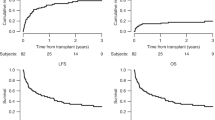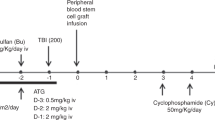Abstract
In AML, a complex aberrant karyotype is associated with poor response to chemotherapy and dismal prognosis. We prospectively studied the concept of allogeneic haematopoietic SCT (HSCT), performed early and regardless of response to induction treatment in patients with complex karyotype AML (CK-AML). The preparative regimen consisted of fludarabine, Ara-C and amsacrine (FLAMSA) chemotherapy, followed by reduced intensity conditioning (RIC) 3 days later. In vivo T-cell depletion by anti-thymocyte globulin was used to protect from early GvHD, and prophylactic donor lymphocyte transfusion was given from day+120 to augment the GvL effect, once tolerance was established. Eighteen consecutive patients with CK-AML (median age: 53 years) received HSCT from related (n=7) or unrelated (n=11) donors. Before FLAMSA–RIC, nine patients each had received one and two induction courses. Stage at start of FLAMSA–RIC was CR/CRi (n=8) or persistent disease (n=10). Following HSCT, 16 patients achieved CR. After a follow-up of 51 months, 11 patients are alive in CR, whereas seven have died in remission (n=3), or from leukaemia (n=4). Cumulative incidence of relapse, non-relapse mortality, acute GvHD⩾II and chronic GvHD were 0.222±0.098, 0.235±0.104, 0.367±0.120 and 0.481±0.123, respectively. Four-year survival from HSCT is 61%. Early HSCT following FLAMSA–RIC may improve the outcome of this unfavourable AML subgroup.
This is a preview of subscription content, access via your institution
Access options
Subscribe to this journal
Receive 12 print issues and online access
$259.00 per year
only $21.58 per issue
Buy this article
- Purchase on Springer Link
- Instant access to full article PDF
Prices may be subject to local taxes which are calculated during checkout



Similar content being viewed by others
References
Slovak ML, Kopecky KJ, Cassileth PA, Harrington DH, Theil KS, Mohamed A et al. Karyotypic analysis predicts outcome of preremission and postremission therapy in adult acute myeloid leukemia: a Southwest Oncology Group/Eastern Cooperative Oncology Group Study. Blood 2000; 96: 4075–4083.
Mrozek K . Cytogenetic, molecular genetic, and clinical characteristics of acute myeloid leukemia with a complex karyotype. Semin Oncol 2008; 35: 365–377.
Haferlach T, Kern W, Schoch C, Schnittger S, Sauerland C, Heinecke A et al. A new prognostic score for patients with acute myeloid leukemia based on cytogenetics and early blast clearance in trials of the German AML Cooperative Group. Haematologica 2004; 89: 408–418.
Koreth J, Schlenk R, Kopecky KJ, Honda S, Sierra J, Djulbegovic B et al. Allogeneic stem cell transplantation for acute myeloid leukemia in first complete remission: systematic review and meta-analysis of prospective clinical trials. JAMA 2009; 301: 2349–2361.
Dohner H, Estey E, Amadori S, Appelbaum F, Buchner T, Burnett A et al. Diagnosis and management of acute myeloid leukemia in adults: recommendations from an international expert panel, on behalf of the European LeukemiaNet. Blood 2010; 115: 453–474.
Messner H . Current status of blood and marrow transplantation for patients with AML. Bone Marrow Transplant 2008; 42: 14–17.
Bacher U, Haferlach C, Schnittger S, Kern W, Kroeger N, Zander AR et al. Interactive diagnostics in the indication to allogeneic SCT in AML. Bone Marrow Transplant 2009; 43: 745–756.
Gale RP, Horowitz MM, Weiner RS, Ash RC, Atkinson K, Babu R et al. Impact of cytogenetic abnormalities on outcome of bone marrow transplants in acute myelogenous leukemia in first remission. Bone Marrow Transplant 1995; 16: 203–208.
Cornelissen JJ, Van Putten W, Verdonck L, Theobald M, Jacky E, Daenen SMG et al. Results of a HOVON/SAKK donor versus no-donor analysis of myeloablative HLA-identical sibling stem cell transplantation in first remission acute myeloid leukemia in young and middle aged adults: benefits for whom ? Blood 2007; 109: 3658–3666.
Tallman MS, Dewald G, Gandham S, Logan B, Keating A, Lazarus HM et al. Impact of cytogenetics on outcome of matched unrelated donor hematopoietic stem cell transplantation for acute myeloid leukemia in first or second complete remission. Blood 2007; 110: 409–417.
Schmid C, Schleuning M, Ledderose G, Tischer J, Kolb HJ . Sequential regimen of chemotherapy, reduced-intensity conditioning for allogeneic stem-cell transplantation, and prophylactic donor lymphocyte transfusion in high-risk acute myeloid leukemia and myelodysplastic syndrome. J Clin Oncol 2005; 23: 5675–5687.
Schmid C, Schleuning M, Schwerdtfeger R, Hertenstein B, Mischak-Weissinger E, Bunjes D et al. Long-term survival in refractory acute myeloid leukemia after sequential treatment with chemotherapy and reduced intensity conditioning for allogeneic stem cell transplantation. Blood 2006; 108: 1092–1099.
Buchner T, Berdel W, Haferlach C, Haferlach T, Müller-Tidow C, Braess J et al. Age-related risk profile and chemotherapy dose response in acute myeloid leukemia: a study by the German Acute Myeloid Leukemia Cooperative Group. J Clin Oncol 2009; 27: 61–69.
Schetelig J, Bornhauser M, Schmid C, Hertenstein B, Schwerdtfeger R, Martin H et al. Matched unrelated or matched sibling donors result in comparable survival after allogeneic stem-cell transplantation in elderly patients with acute myeloid leukemia: a report from the Cooperative German Transplant Study Group. JClin Oncol 2008; 26: 5183–5191.
Sorror ML, Maris M, Storb R, Baron F, Sandmaier BM, Maloney D et al. Hematopoietic cell transplantation (HCT)-specific comorbidity index: a new tool for risk assessment before allogeneic HCT. Blood 2005; 106: 2912–2919.
Sullivan KM . Graft-versus-host-disease. . In Hematopoietic Cell Transplantation. Thomas E, Blume K, Forman SJ, (eds). 2nd, Blackwell Science; Boston, 1999, 515–536 Ref Type: Serial (Book,Monograph).
Schoch C, Schnittger S, Bursch S, Gerstner D, Hochhaus A, Berger U et al. Comparison of chromosome banding analysis, interphase- and hypermetaphase-FISH, qualitative and quantitative PCR for diagnosis and for follow-up in chronic myeloid leukemia: a study on 350 cases. Leukemia 2002; 16: 53–59.
Shaffer LG, Slovak ML, Campbell LJ, ISCN. An international System for Human Cytogenetic Nomenclature. S. Karger, Basel, Switzerland, 2009.
Grimwade D, Walker H, Oliver F, Wheatley K, Harrison C, Harrison G et al. The importance of diagnostic cytogenetics on outcome in AML: analysis of 1612 patients entered into the MRC AML 10 trial. The Medical Research Council Adult and Children’s Leukaemia Working Parties. Blood 1998; 92: 2322–2333.
Schoch C, Haferlach T, Haase D, Fonatsch C, Loffler H, Schlegelberger B et al. Patients with de novo acute myeloid leukaemia and complex karyotype aberrations show a poor prognosis despite intensive treatment: a study of 90 patients. Br J Haematol 2001; 112: 118–126.
Horowitz MM, Gale RP, Sondel PM, Goldman JM, Kersey J, Kolb HJ et al. Graft-versus-leukemia reactions after bone marrow transplantation. Blood 1990; 75: 555–562.
Schmid C, Labopin M, Nagler A, Bornhauser M, Finke J, Fassas A et al. Donor lymphocyte infusion in the treatment of first hematological relapse after allogeneic stem cell transplantation in adults with acute myeloid leukaemia: a retrospective risk factors analysis and comparison with other strategies by the EBMT Acute Leukemia Working Party. J Clin Oncol 2007; 25: 4938–4945.
Platzbecker U, Thiede C, Fussel M, Geissler G, Illmer T, Hanel M et al. Reduced intensity conditioning allows for up-front allogeneic hematopoietic stem cell transplantation after cytoreductive induction therapy in newly-diagnosed high-risk acute myeloid leukemia. Leukemia 2006; 20: 707–714.
Michallet M, Thomas X, Vernant JP, Kuentz M, Socie G, Esperou-Bourdeau H et al. Long-term outcome after allogeneic hematopoietic stem cell transplantation for advanced stage acute myeloblastic leukemia: a retrospective study of 379 patients reported to the Societe Francaise de Greffe de Moelle (SFGM). Bone Marrow Transplant 2000; 26: 1157–1163.
Breems D, Van Putten W, de Greef G, van Zelderen-Bhola S, Gerssen-Schoorl K, Mellink C et al. Monosomal karyotype in acute myeloid leukemia: a better indicator of poor prognosis than a complex karyotype. J Clin Oncol 2008; 26: 4791–4797.
Suciu S, Mandelli F, de Witte T . Allogeneic compared with autologous stem cell transplantation in the treatment of patients younger than 46 years with acute myeloid leukemia (AML) in first complete remission (CR1): an intention-to-treat analysis of the EORTC-GIMEMA AML-10 trial. Blood 2003; 102: 1232–1240.
Acknowledgements
We thank Anne Franke, Munich, Angelika Cook, Wiesbaden and Silvia Soellner, Augsburg, for assistance in data collection.
Author information
Authors and Affiliations
Corresponding author
Ethics declarations
Competing interests
The authors declare no conflict of interest.
Rights and permissions
About this article
Cite this article
Schmid, C., Schleuning, M., Tischer, J. et al. Early allo-SCT for AML with a complex aberrant karyotype—results from a prospective pilot study. Bone Marrow Transplant 47, 46–53 (2012). https://doi.org/10.1038/bmt.2011.15
Received:
Revised:
Accepted:
Published:
Issue Date:
DOI: https://doi.org/10.1038/bmt.2011.15
Keywords
This article is cited by
-
Comparable outcome after haploidentical and HLA-matched allogeneic stem cell transplantation for high-risk acute myeloid leukemia following sequential conditioning—a matched pair analysis
Annals of Hematology (2019)
-
Low-dose alemtuzumab for GvHD prevention followed by prophylactic donor lymphocyte infusions in high-risk leukemia
Bone Marrow Transplantation (2017)
-
Relapse of AML after hematopoietic stem cell transplantation: methods of monitoring and preventive strategies. A review from the ALWP of the EBMT
Bone Marrow Transplantation (2016)
-
Risk factors for outcome in refractory acute myeloid leukemia patients treated with a combination of fludarabine, cytarabine, and amsacrine followed by a reduced-intensity conditioning and allogeneic stem cell transplantation
Journal of Cancer Research and Clinical Oncology (2016)
-
Clofarabine salvage therapy before allogeneic hematopoietic stem cell transplantation in patients with relapsed or refractory AML: results of the BRIDGE trial
Leukemia (2016)



